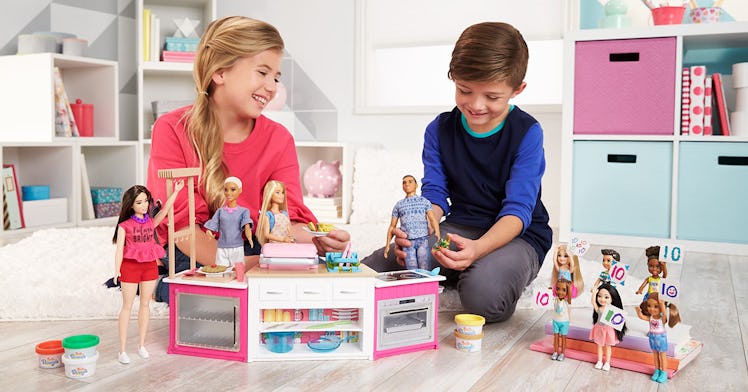6 Ways to Raise a More Empathetic (And Successful) Kid
And what parents can do to foster this trait in their kids.

This article was written in partnership with Barbie®.
As the world expands, systems that went unquestioned for decades are being challenged, identities are becoming stronger and more multifaceted, and organizations from schools to corporations are recognizing the value of diversity and taking steps to increase it among their ranks.
In this environment, empathy—the ability to understand and share the feelings of other people—is becoming more and more valuable. And luckily for parents, it’s a skill that can be built up over time, a habit that can be instilled in kids and continue to develop into their adult lives, where it helps them be better collaborators, leaders and parents. It’s best to start with listening, because it’s only by absorbing the experiences of others that one can begin to grasp their feelings. Being a good listener also means making the speaker feel heard, which can lower the temperature in a heated situation and prevent animosity from developing in the first place.
Here are some things parents can do to foster empathy in their kids and make them not just a good person but one prepared for future success.
Lead by example and share your feelings with your kids. Talking about your own emotions and asking your kids about theirs (and listening intently to their response) are strategies parents should deploy early and often. During early childhood, kids are naturally egocentric, which means they form their moral positions based on what their family rewards as good behavior. So consciously rewarding the expression of emotions and listening to others’ emotions is a great way to take advantage of the time before their influences multiply.
Encourage them to play with dolls, especially when you can’t play with them. It might seem that kids can only build empathy while they’re around other people, but a recent study* from Cardiff University in collaboration with Barbie® showed that when kids played with dolls, regions of the brain associated with social information processing and empathy were activated, even when they were playing alone. This suggests that playing with dolls might help foster empathy even during solo play. In comparison, tablet play did not show the same levels of activation in areas associated with developing empathy.
Validate their feelings. With the benefit of hindsight, parents know that there’s no reason to be afraid of the monster under the bed or furious at being asked to eat vegetables. Kids don’t know these things, of course, so there’s a real risk of dismissing their feelings. Instead, they should acknowledge those feelings and ask questions about them. “When a parent acknowledges and names feelings, this helps a child feel understood. Feeling this from others helps build the ability to do this when interacting with others later on, which is a foundational component of empathy,” says psychologist Dr. Brit Creelman.
Be real when playing together. Toys are great for keeping kids entertained while parents take care of other priorities, but parents still need to make time to play with their kids (and their kids’ dolls). When you do, play-act like the dolls are just like you, processing emotion and displaying empathetic behavior. Ask questions about how the dolls are feeling in their imaginary situations. By verbalizing and considering the emotions of their dolls’ imagined personalities, kids are practicing verbalizing their own emotions and considering the emotions of others in the future.
Read with the characters in mind. When reading stories to or with your kids, ask them why they think the characters act, feel, or think like they do. Go one step further and act stories with dolls playing the parts, deepening the lesson on the importance of understanding others while giving your kid a chance to be creative too. Reading and acting out stories are easy opportunities for your kid to practice separating from their own point of view, a necessary step to leaving the egocentrism of their early years behind.
Expose them to different people living different lives. It might be by volunteering at a local charity. Or watching documentaries about far-flung places. Or attending a protest for a cause that doesn’t directly affect them. Or giving them a doll with a backstory rooted in a world far removed from their own. Kids can learn a lot from seeing how other people live and, if possible, working to solve problems that they haven’t personally experienced.
*”Exploring the Benefits of Doll Play Through Neuroscience” was commissioned by Barbie (2020). Study was conducted with 42 children (20 boys and 22 girls) ages 4-8 years old with full data captured from 33 children.